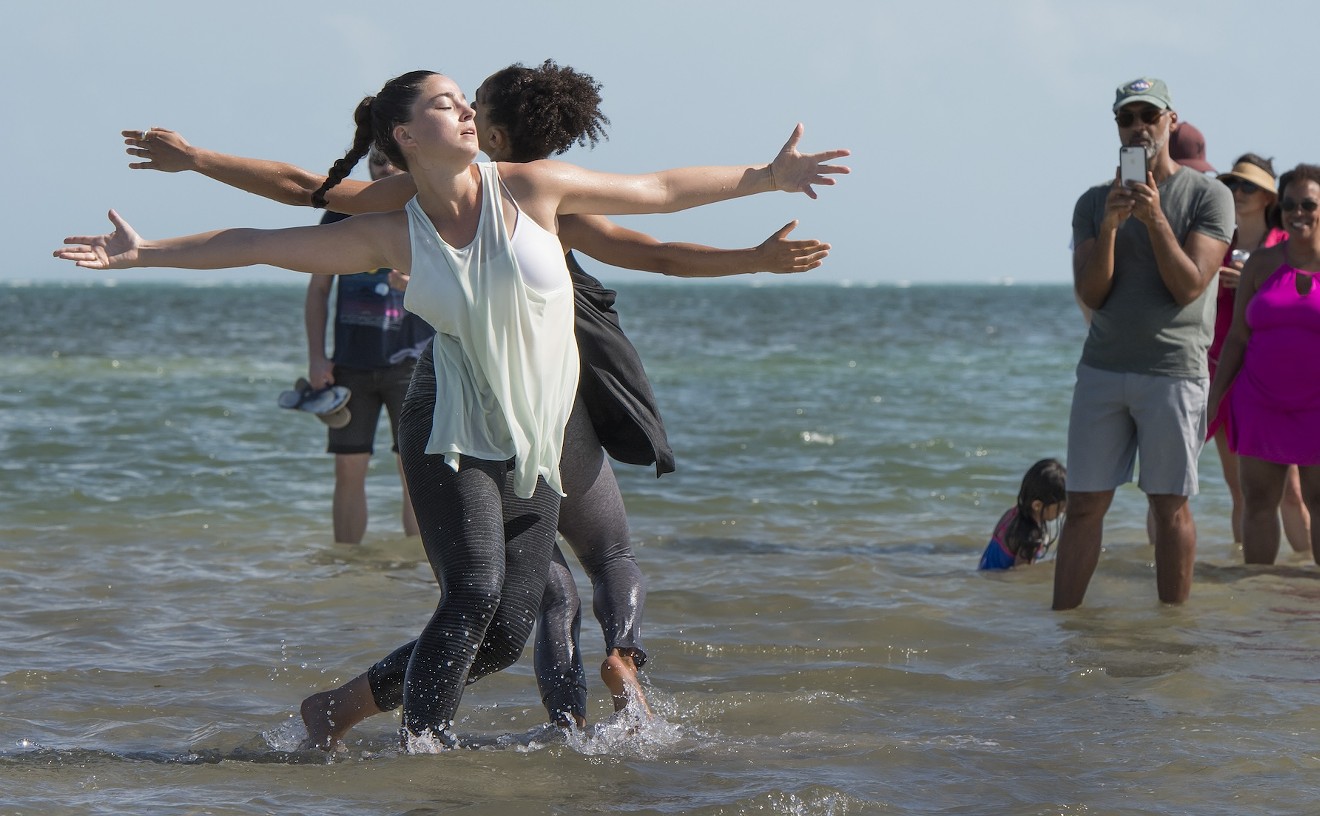Terrence McNally's Mothers and Sons, which opened last weekend at GableStage, is a profound inquiry into the human condition, delivered in a sweepingly emotional experience that fully justifies the art form. It's been far too long since I left an auditorium as teary, speechless, and physically affected. This production is why theater exists.
The play is set in an enviable Central Park apartment — a living room designed by Lyle Baskin that teems with the trappings of a bourgeois nuclear family. Travel trinkets share bookshelf space with difficult tomes, and children's toys are piled into a tidy silo. Significant memories are framed on hallway walls and tucked away in shoeboxes. This is where Cal (Michael McKeever), an affluent money manager, lives with his writer husband Will (Jeremiah Musgrove) and their son Bud (either Gabe Sklar or Max Leifman).
This day, which unfolds impressively in real time, they have an unexpected guest: Katharine Gerard (Angie Radosh), the mother of Andre, who was Cal's partner 20 years earlier. Andre, a talented actor, died of AIDS. Katharine didn't accept her son's sexuality then, and she still doesn't, implicitly blaming Cal for her son's "decision" to enjoy the company of men. As her interrogation of Cal commences, both release decades of resentment. They confront lingering traumas, stumbling along a thorny path toward enlightenment and acceptance. It's theater as gestalt therapy.
McNally, a gay screenwriter and playwright who has been documenting same-sex issues for most of his creative life, debuted Mothers and Sons on Broadway this past spring, accruing a couple of Tony nominations in the process. It's actually a sequel to a 1988 telefilm called Andre's Mother, set during Andre's memorial service.
I've never seen the film, and neither will have most attendees of Mothers and Sons, which is just fine: For all intents and purposes, this is a standalone piece, full of actorly gifts and humor that never fail to arrest. McNally's laugh lines are usually of an uncomfortable sort, drifting in and out of otherwise dramatic exchanges, just like in life.
He's also a deeply empathetic writer. Among many subjects the play addresses, Mothers and Sons is about the fact that times have changed even if people haven't. While McNally most obviously identifies with Cal and Will, he never demonizes Katharine for her regressive views, instead chipping away at the character until all of her emotional wounds are exposed.
Director Joseph Adler understands all of this, building McNally's lengthy, unbroken scene with the patience of an architect overseeing a building's construction one brick at a time. The performances of Radosh and McKeever are his towering accomplishment. McKeever dominates the first several pages of the script, but don't be surprised if your eyes spend more time on Radosh, overdressed-to-impress in a fur coat and sparkling brooch, her lips pursed, her eyes weary and judging. She at first seems to lack a reason to scream and cry at her overly polite host. It's a dynamic and beautifully restrained introduction, conveying a full worldview with a minimum of words.
But things don't remain cordial for long. Passive-aggressive comments and disparaging euphemisms, which Katharine and Cal inject into their conversation like muted fireworks, are brushed off until their accumulation proves too much to ignore.
Radosh has a reputation for playing self-deluded women, especially in the exemplary Tennessee Williams turns at New Theatre. A similar spirit imbues Katharine. Radosh flawlessly sells her character's boxy denial in lines like "Andre wasn't gay when he came to New York!" — an argument that is funnier because of the absolute sincerity with which it is delivered.
Radosh and McKeever are at their finest when spilling forth their characters' guts and exposing their souls. They are consistently in the moment, never acting and always reacting. If we expect such immersion from Radosh, it's still something of a pleasant surprise (though it shouldn't be) that funnyman McKeever proves so capable of digging so deeply into a drama so powerful. Both actors' climactic breakthroughs are moving beyond words.
But a lot of this play's power ultimately rests on McNally's ability to thread the needle between the specific and the universal. The story is rooted in the effects that AIDS — and the closet — had on the gay community in the late 20th Century. It contrasts this period with subsequent advances toward equality and HIV management. Yet as we see Cal and Will fend off aggravating questions from their precocious child or discuss their duties regarding the boy's evening bath, we're watching the interactions of any family, gay or straight.
And if you don't recognize your own mother in Radosh, you're not looking hard enough; the desperate feeling that a stranger has taken your offspring away from you cuts across lines of gender and sexuality.
It's no accident that McNally pluralized the title of his play. It's not just about one mother and one son; it's about all of us.










